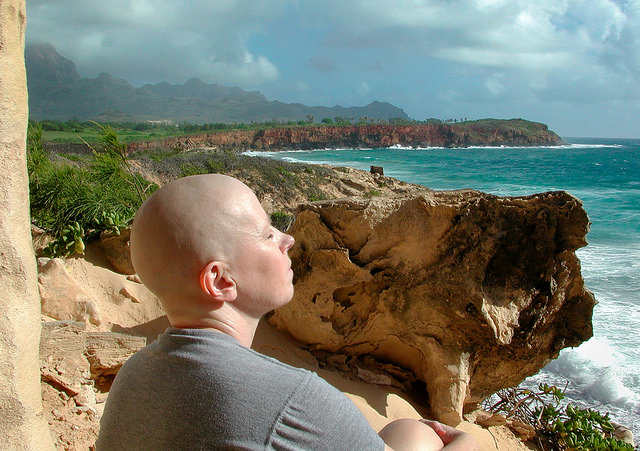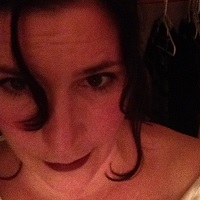
There was a bald girl in the pool today.
She’s the first bald child I’ve seen, in person, since my older son finished his chemotherapy and radiation. I didn’t notice her at first. My mind was turned inward, soothed by the laps and the mantra I was breathing as I swam: “Yes to life.”
My resolution today was to embrace unequivocally anything life offered.
I was thinking along the lines of saying yes if the kids asked for Chinese food, or if I met a tall, dark and handsome stranger.
How does the saying go? Be careful what you wish for.
After 20 minutes of saying yes, trancing to the swim and the feeling of air meeting water, I moved to the therapy pool, where I saw a bald little girl, almost the same age as my son was when he was ill. My first urge was flight. Skip the stretches, re-traumatizing myself, and go. I wanted to run—just as when I see a commercial for St. Jude’s—quickly changing the channel.
No, fight—my mind ready with defenses.
Just tough it out! It’s been long enough. Get over it. This doesn’t bother me! I can even say”my kid had cancer” without crying. (This accomplishment took six years, three retreats with Ram Dass, constant meditation, prayer, therapy, meds and nine months living in a surf town in Costa Rica).
Despite myself, I look. I need to see her mother, I want to be able to speak to her, offer her something. There is only one woman it could be. I know those eyes. I couldn’t look in mirrors because my eyes looked like that.
I start to stretch, but the girl and her therapist are only a few feet away. I see they are doing foot exercises. She must be on Vincristine, and it’s starting to affect her feet. I wish I didn’t know this; my son’s walk started getting funny too. No problem, I’ll stretch with my eyes closed and face the other way. My mind is racing, but no way will I freak out. With the adrenaline wearing off, I am calm enough to send arrow prayers to the little girl. My mind confidently in charge—no emotions, no reaction, nothing to see here—I have conquered this. No need to cry.
I open my eyes, sensing someone suddenly close to me—an older gentlemen asks in the softest, kindest voice:
“Hey, are you okay?”
“Oh, just fine.”
“You don’t look fine.”
I burst into tears. He waits. I lean closer and whisper,
“My son is a cancer survivor—when I see…”
He pats me on the shoulder.
“I’ll say a prayer for the girl.”
These are the moments when years of practice kick in, when habit is a good thing; with tears falling, I hear my teachers:
Cry, but don’t tell yourself a story about why you are crying.
Cry, don’t die. It is the tears you don’t shed that kill you.
The tears subside, replaced by image after forgotten image. Eyes closed, I see again: my son, the medical devices, the first needle stick for counts, the way his port looked and the chemo rooms at Sloan. I hear, again, the horrible sounds of suffering. (Anyone who has ridden the post-traumatic stress disorder (PTSD) train of terror knows that the mind is an excellent jailer. When triggered, those locked up prisoners are freed. The jailer distracted, prisoners escape.)
My mind calms, and I hear my teacher, Ram Dass, and remember: be here now. My PTSD therapist gave me powerful words to use after a trigger:“Nothing is molecularly wrong in this moment. None of it is happening now.”
It is though—just not to me.
My mind is running away with itself, longing to offer something to this woman. I want to say:
“Stay Strong.”
“She’ll be okay.”
“I have faith.”
But God dammit, she already is and doesn’t need me to tell her that. (When my son was sick, people told me he would be fine, and I wanted to punch them in the face.) There is no guarantee. I want to say a million things. I ask myself if I would want to be spoken to—even by a fellow traveler.
Yes and no.
Yes, maybe it would encourage her. No, maybe she is having one of those days when one word of compassion and kindness would break her; keeping emotions at bay helps her survive. I say nothing, but continue to pray.
My flashbacks abates. I am grateful, not only that I have a long-hidden Xanax stashed away, but that I won’t need it. I am better, despite the tears.
I had a long dark time after my son was ill. I am terrified of ever getting lost in that dark forest again. I am grateful that I can see the forest and not be dragged back in. Investing 15 years in meditation was a good thing.
Later, in the car, enjoying the drive to my children, my mind was quiet enough for me to hear my heart speak. These are words I wish I could say to that mother—eight years ahead of her—words that I need to remember for myself:
We did not choose and would never have chosen for our child to have cancer. Facing his own mortality, at age eight, has definitely shaped my son’s character. Well aware that he or anyone could die at any moment. He knew he wanted to play drums; when his treatment ended, he started playing drums—practicing several hours a day. At 16, he is an accomplished multi-instrumentalist and composer. He is also wise, compassionate, loving and clear-sighted.
Is that worth six months of hell and horrible suffering? I can’t say, but it doesn’t matter, as it wasn’t a choice. My own nervous breakdown after his illness led inexorably to a complete destruction of everything I thought I was and every role I played. This has turned out to be a good thing.
I can’t say these words to a stranger. I wish I could. I wish I could pass on just one message:
In the grips of it, we have no idea why, or how, but if we have faith and simply keep holding on, one day, a kind of retrospective clarity will come.
Not clarity about why children must suffer—never that. For that I can only know that the world is full of suffering as well as Grace, and we all can expect some measure of both.
There will come a day when we will look back and see the Grace that came from the suffering.
That, is what I say yes to, today.
~
Relephant:
How Suffering Brings Us Closer to God.
~
Author: Nicole DiSalvo Billa
Image: Sarah Reid/Flickr // Sheila Sund/Flickr
Apprentice Editor: Theresa Wolfrom; Editor: Toby Israel
~










Read 1 comment and reply